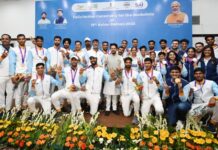DEPARTMENT OF PUBLIC RELATIONS
CHANDIGARH ADMINISTRATION
PRESS RELEASE
Gambusia Fish seedlings released to prevent Malaria/dengue in U.T. Chandigarh

Chandigarh.29 September,2020: The Animal Husbandry & Fisheries Department of Chandigarh in coordination with Forest Department initiated step to fight against mosquito borne diseases like malaria, dengue which is common in ongoing season when mosquitoes breed very rapidly causing the spread of these diseases.
The Fisheries department released Mosquito Killer fish (Gambusia) at Butterfly park, Sector-26, Botanical garden Dhanas, Rose Garden, Sector: 16 Chandigarh on 29.9.20 for preventing malaria/dengue and to maintain ecological balance. The gambusia fish will be released in other water points shortly. Dr. Abdul Qayum, IFS, Deputy Conservator Forest and Sh. Tejdeep Singh Saini, Director Department of Animal Husbandry and Fisheries, U.T. Chandigarh were present on the occasion.
Dr. Abdul Qayum, appreciated the efforts of the Animal Husbandry Department for playing an active role in conservation of the ecology of Sukhna wetland. The problem of mosquitoes breeding in clear water, especially Aedes aegypti mosquitoes which carry the dengue virus can be controlled ecological manner through Gambusia fishes.
Sh. Tejdeep Singh Saini, Director Animal Husbandry & Fisheries U.T. Chandigrah stated that the Gambusia released in the water bodies is being produced at Fish Seed Farm at Regulator end Sukhna Lake functioning under .U.T. Fisheries Department . The department breeds this fish in March and then releases it up to December as per requirement. He also informed that in the Northern region, Govt. Fish Seed Farm, Chandigarh at Regulatory end, Sukhna Lake is the only farm which breeds the rare fishes and supplies to several agencies, free of cost for stocking in stagnant water bodies to prevent mosquito breeding.
On the occasion, Dr Kanwarjit Singh Joint Director of Animal Husbandry & Fisheries apprised that Gambusia has a voracious appetite; an adult mosquito fish can eat up to 150 mosquito larvae in an 8 hour period. This makes them an excellent biological tool for mosquito control because the fish consume the larvae before they have a chance to develop into adult mosquitoes. He further appealed to public to approach the Fish Seed Farm for collecting mosquito fish for releasing at stagnant water points, artificial fountains and ponds inside houses to check and control mosquito breeding.














